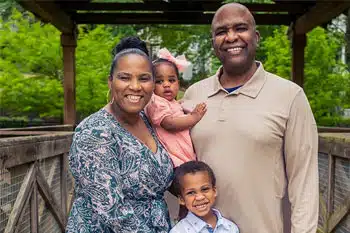
People will undoubtedly ask questions, whether it’s family, friends, or strangers. But, as an adoptive parent, you are responsible for deciding how much you share.
How do we learn not to overshare our children’s adoption stories? What follows are some tips and general guidelines to help you navigate these conversations and stay mindful of what you share.
Respect Your Child’s Privacy
Your child’s adoption story is their story to tell. While you will likely decide to share some information with family and close friends, respecting your child’s privacy is important.
Before sharing any details about your adoptee’s story, ask yourself if it’s information your child would be comfortable having floated out in the universe about them. Sharing their full story may be a way to connect with someone, but at whose expense?
It may seem innocent enough to talk about this information when your child is a baby or toddler, but she will not always be young, and the people you tell will not forget the details. It is human nature to tell others what we know, so the people you tell will probably share the information with a few of their closest friends, who will share it with a few of their closest friends, and on and on.
Your child will one day grow up and hear the adoptee stories we tell now repeated back to them. Some children, teens, and adults will not care one way or the other, but some will be horrified that what they consider personal information is known by all. Imagine little Emily playing with her eavesdropping cousin and hearing, “How come your mom had syphilis?” Or having a neighbor remark, “Well, her mother was in jail so what can you expect” when your pre-teen goes through a sticky finger stage and swipes a candy bar at the store.
A good rule of thumb is to keep the conversation focused on your journey. Share what it was like going through the adoption process and how you felt meeting your child for the first time.
Make the Conversation a Learning Experience
If someone asks for explicit details about your child’s story, you can respectfully decline to answer them. Then, share what you’ve learned about adoptees, open adoption, or your adoption journey. For example, you might talk about using positive adoption language, the different types of adoption, and the impact adoption has on adoptees.
As your child grows, you can honestly and compassionately share all of his information in a way he understands. You can answer his questions and assure him that he is more than a reflection of his birth parent’s history. You can even place his birth parent’s actions in the context of their background, situation, and culture.
Sharing in this way is the best method, but you won’t have the opportunity to shape what your child hears if your child is getting this information from others. It is for you and your child to decide who else should know this information, and when your child first arrives is not the time to make that decision.
With Adoptee Stories, Know Your Audience
While some people may be genuinely interested in learning more, others may ask questions out of curiosity or judgment. Be prepared to respond appropriately to all types of questions and comments. Sometimes, you can even have fun with it!
It’s okay to share what state you adopted your child from but avoid more personal questions about your child’s birth family and the circumstances that led to their adoption.
With extended family, you may choose to share more with some family members but use restraint with others. It would help if you assumed that whatever you say may be repeated to your child someday, so share only the information you want her to hear from others.
You can always share more information in the future if you think they need to know or if your child wants to, but you can never take back information once it’s told. The good news is that the nosy background-type questions usually subside as your child grows older.
Emphasize the Positive
Adoption is a beautiful event that brings families together. When sharing your child’s adoption story, emphasize the positive aspects of the adoption process. Talk about how much you love your child and how grateful you are to have them in your life.
Here are some resources to help you determine how to best talk to your child about their adoption:
- Webinar: Talking about Adoption With Your Child: Sharing Your Story from the Start
- Article: Adoption Conversations: How & When to Tell a Child They’re Adopted
- The American Academy of Pediatrics guide: When to Tell Your Child About Adoption
- Podcast: How to Talk Open Adoption with Young Children
What Not to Share
Adopting will forever impact your lives so it’s only natural to want to talk about it with anyone and everyone. Deciding when and how to share your child’s story publicly can be tricky to navigate, especially when it seems everyone around us is posting photos and stories of their children online.
Social media posts focused on children are usually met with adoration from most people, who might like a break from the rest of their feed which is full of rants and arguments. Naturally, adoptive parents would like also to be able to share their parenting joys online. Such sharing is prevalent, with thousands of posts tagged #adoptionrocks.
But before disclosing all of the details of your child’s adoption, remember that this story doesn’t belong just to you. This story is shared by your child and your child’s birth parents as well.
You may be wondering, “How much information is too much when sharing our story?” What may be considered too private to share? Five adoption details you should always keep private include:
1. Identifying information
It should probably go without saying that you shouldn’t be providing contact information for your child’s birth parents. However, especially in the era of social media, you should be careful about posting photos, sharing names, and communicating other seemingly innocent details online.
Before posting any potentially identifying or sensitive information online, consider asking an adoption professional or checking in with your child’s birth mother. Designate boundaries with your child’s birth parents about what details should and should not be shared on social media.
2. The birth family’s reason for choosing adoption
As you build your relationship with the birth family, you may exchange personal details about your reasons for choosing adoption. For example, an expectant mother might confide in you about her financial struggles or her complicated relationship with her baby’s father. Similarly, you might share private details about fertility treatments or past failed pregnancies.
These private details are just that — private. It’s never okay to tell someone else’s personal story with friends or family members who aren’t in your adoption triad. Even though curious friends and acquaintances might want to know the birth parents’ backstory, you can kindly let them know that it isn’t your information to share.
3. Grievances with your child’s birth family
Like any relationship, an open adoption will have its ups and downs. You may find yourselves feeling frustrated with the birth parents at times. Perhaps you don’t agree with certain lifestyle decisions they’ve made, or maybe you’re upset that they don’t respond to the updates you’ve emailed them.
Whatever the case, it’s not a good idea to vent your frustrations to a third party (especially on social media!) Your remarks could harm your child’s perspective of her birth family. If what you said ever somehow got back to the birth family, it could cause serious damage to your relationship. Instead of venting, attempt to address your concerns directly with them calmly.
4. Anything your child doesn’t know
At the end of the day, your child’s adoption story belongs to him and no one else. Of course, the information you share with your child about their adoption will change as he grows. There may be certain details you don’t share with them when they’re young.
But until your child has all of the information about his adoption, a good rule to follow is not to share those details with others. Consider how your child would feel if they found out that aunts, uncles, cousins, or even neighbors know more about their history than they do. Respect your child’s right to privacy, allowing them to know the details of their own adoption story.
5. Anything you don’t feel comfortable sharing
You don’t owe anyone any details about your adoption process. Even if people ask nosy or insensitive questions, it’s always up to you when (and if) you share information about your child’s adoption story. Barring a few important medical and adoption professionals, the only people who need to know anything about your adoption are the ones who played a part in it.
Sharing Adoptee Stories
It’s natural to feel a deep sense of pride and love for your child, and with that comes the desire to share their story. While your role in the adoption process is significant, your child’s story is something they should have control over as they grow and develop an understanding of it.
Wanting to share our child’s adoption story most often comes from a good place. We are proud of adoption and the obstacles our children have overcome. But good intent does not do away with our need for caution.
Remember, once you share any part of your child’s story, you can’t take it back. It then becomes the responsibility of the person you shared it with, who they will share it with, and so on. And you never want your child to find something out about their story from someone other than you or their birth family.
Ultimately, it is your child’s story; when they are old enough, they will choose how, when, and if they share it.
Editor’s Note: This article was originally published on May 24, 2023, and has since been updated.
Heidi Keefer is a Content Creator for Lifetime Adoption and has over 15 years of experience in the field of adoption. An author of thousands of articles and social media posts over the years, Heidi enjoys finding new ways to educate and captivate Lifetime’s ever-growing list of subscribers.
Heidi has a keen eye for misplaced apostrophes, comma splices, and well-turned sentences, which she has put to good use as a contributor to Lifetime’s award-winning blogs. She has written and published hundreds of adoption articles which explore the various facets of domestic infant adoption today.






0 Comments